《英语翻译基础》讲义及《样题和答案》
《英语翻译入门----英译汉翻译入门》练习参考答案
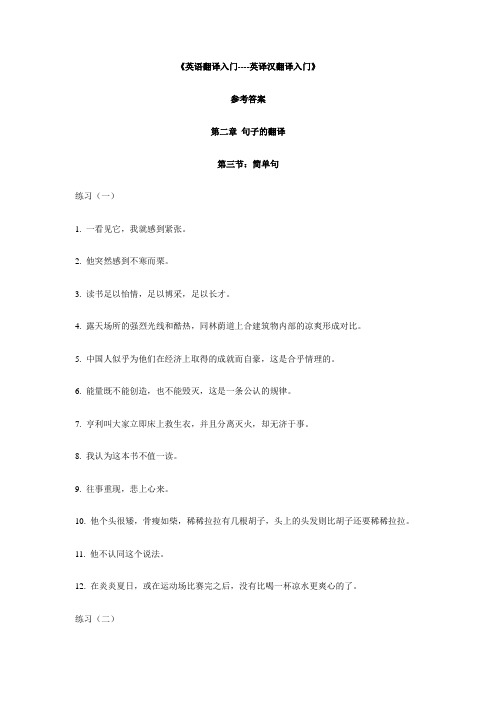
《英语翻译入门----英译汉翻译入门》参考答案第二章句子的翻译第三节:简单句练习(一)1. 一看见它,我就感到紧张。
2. 他突然感到不寒而栗。
3. 读书足以怡情,足以博采,足以长才。
4. 露天场所的强烈光线和酷热,同林荫道上合建筑物内部的凉爽形成对比。
5. 中国人似乎为他们在经济上取得的成就而自豪,这是合乎情理的。
6. 能量既不能创造,也不能毁灭,这是一条公认的规律。
7. 亨利叫大家立即床上救生衣,并且分离灭火,却无济于事。
8. 我认为这本书不值一读。
9. 往事重现,悲上心来。
10. 他个头很矮,骨瘦如柴,稀稀拉拉有几根胡子,头上的头发则比胡子还要稀稀拉拉。
11. 他不认同这个说法。
12. 在炎炎夏日,或在运动场比赛完之后,没有比喝一杯凉水更爽心的了。
练习(二)1. 理性是人的特点。
2. 事实胜于雄辩。
3. 彩电的价格比上月有所下降。
4. 他们力争降低出生率。
5. 就其价格和产品的种类而言,这些市场颇具竞争力。
6. 外宾们惊讶地注视着南京路上熙熙攘攘的人群。
7. 她无意与她有任何瓜葛。
8. 我对玛雅人佩服得五体投地。
9. 她的智力超过常人。
10. 她身体虽弱,但思想健康。
练习(三)1. 破旧立新。
2. 患难见真交。
3. 法官与其他高职人员有时与歹徒穿连裆裤勾结欺诈。
4. 一些年轻人上大学,与其说是为了学知识,还不如说是为了谋个出路。
5. 操作这台机器时,你无论怎样小心也不过分。
6. 爱你在心口难开。
7. 我总能找个词凑合着用,可是皮特什么时候都能找到恰如其分的词儿。
8. 他挖空心思,反而把事情全盘弄糟了。
9. 我们绝不能忽视消费者的权利。
10. 我喜爱那洁净的暖风吹拂在我的皮肤上是我陶然欲醉,也喜爱那清亮的流水把我的身体托浮在水面。
练习(四)1. 他们的生活远不止那些政治的、社会的和经济的问题,远不止一时的柴米油盐。
2. 他一直缠着我要她在伦敦的地址。
3. 科学发现与发明并不因其越重要就对语言的影响力越大。
郑州大学357英语翻译基础_2012(带答案)

2012年郑州大学357英语翻译基础考研题一、Translation questions(Sub-topics 1-30 are translation questions, Translate the following text into English or TransIate the following text into Chinese. (30 points))1.e-commerce【答案】电子商务【解析】EC(英语: E-Commerce)是指在互联网(Internet)和增值网(Value Added Network)上以电子交易方式进行交易活动和相关服务活动,是传统商业活动各环节的电子化、网络化。
【难度系数】1【分值】12.bioengineering【答案】生物工程【解析】bio-是一个前缀,指“生物的,生物学的”;engineer工程,因此结合起来,就是“生物工程”。
【难度系数】2【分值】13.the Supreme Court【答案】最高法院【解析】supreme最高的;court法院;因此结合起来,就是“最高法院”。
【难度系数】1【分值】14.trade deficit【答案】贸易赤字或外贸逆差【解析】trade贸易;deficit赤字,亏损;因此结合起来,就是“贸易赤字”。
【难度系数】2【分值】15.summit meeting【答案】峰会【解析】summit顶点,最高点;meeting会议;因此结合起来,就是“高峰会议”,即“峰会”。
【难度系数】2【分值】16.air quality monitoring【答案】空气质量监测【解析】air空气;quality质量;monitoring监控,监测;因此,结合起来,就是“空气质量监测”。
【难度系数】1【分值】17.economic community【答案】经济共同体【解析】economic经济的;community社区,团体;因此结合起来,就是“经济共同体”。
翻译入门_练习题参考答案
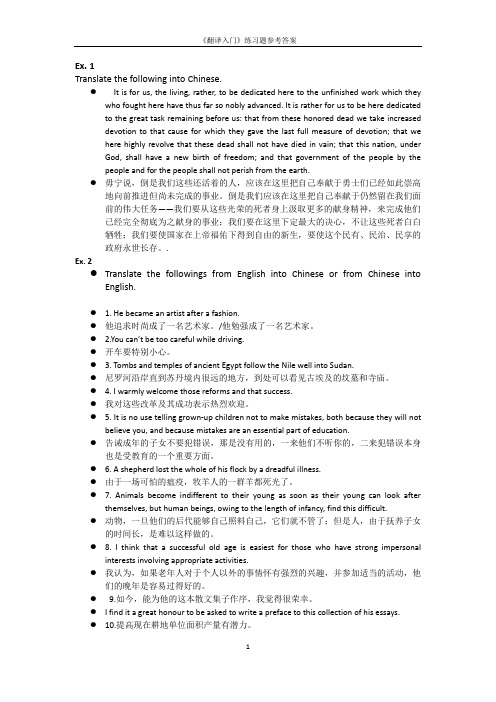
Ex. 1Translate the following into Chinese.●It is for us, the living, rather, to be dedicated here to the unfinished work which theywho fought here have thus far so nobly advanced. It is rather for us to be here dedicated to the great task remaining before us: that from these honored dead we take increased devotion to that cause for which they gave the last full measure of devotion; that we here highly revolve that these dead shall not have died in vain; that this nation, under God, shall have a new birth of freedom; and that government of the people by the people and for the people shall not perish from the earth.●毋宁说,倒是我们这些还活着的人,应该在这里把自己奉献于勇士们已经如此崇高地向前推进但尚未完成的事业。
倒是我们应该在这里把自己奉献于仍然留在我们面前的伟大任务——我们要从这些光荣的死者身上汲取更多的献身精神,来完成他们已经完全彻底为之献身的事业;我们要在这里下定最大的决心,不让这些死者白白牺牲;我们要使国家在上帝福佑下得到自由的新生,要使这个民有、民治、民享的政府永世长存。
.Ex. 2●Translate the followings from English into Chinese or from Chinese intoEnglish.● 1. He became an artist after a fashion.●他追求时尚成了一名艺术家。
基础英语第二册课后翻译题参考答案
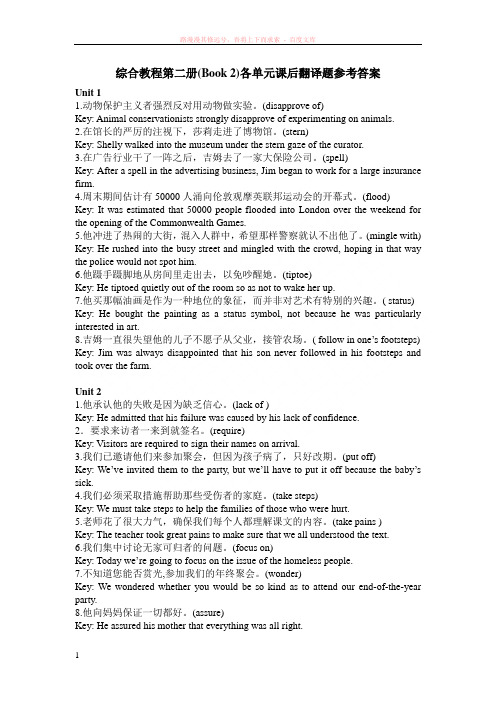
综合教程第二册(Book 2)各单元课后翻译题参考答案Unit 11.动物保护主义者强烈反对用动物做实验。
(disapprove of)Key: Animal conservationists strongly disapprove of experimenting on animals.2.在馆长的严厉的注视下,莎莉走进了博物馆。
(stern)Key: Shelly walked into the museum under the stern gaze of the curator.3.在广告行业干了一阵之后,吉姆去了一家大保险公司。
(spell)Key: After a spell in the advertising business, Jim began to work for a large insurance firm.4.周末期间估计有50000人涌向伦敦观摩英联邦运动会的开幕式。
(flood) Key: It was estimated that 50000 people flooded into London over the weekend for the opening of the Commonwealth Games.5.他冲进了热闹的大街,混入人群中,希望那样警察就认不出他了。
(mingle with) Key: He rushed into the busy street and mingled with the crowd, hoping in that way the police would not spot him.6.他蹑手蹑脚地从房间里走出去,以免吵醒她。
(tiptoe)Key: He tiptoed quietly out of the room so as not to wake her up.7.他买那幅油画是作为一种地位的象征,而并非对艺术有特别的兴趣。
穆雷《英汉翻译基础教程》配套题库(含考研真题)-第一章至第二章【圣才出品】
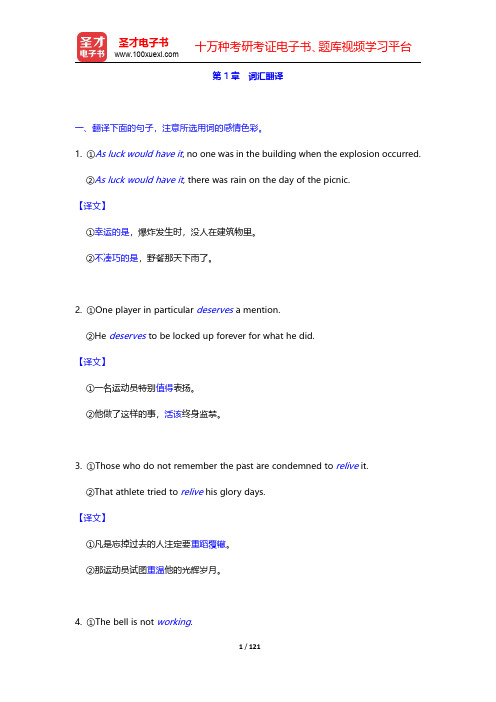
第1章词汇翻译一、翻译下面的句子,注意所选用词的感情色彩。
1.①As luck would have it,no one was in the building when the explosion occurred.②As luck would have it,there was rain on the day of the picnic.【译文】①幸运的是,爆炸发生时,没人在建筑物里。
②不凑巧的是,野餐那天下雨了。
2.①One player in particular deserves a mention.②He deserves to be locked up forever for what he did.【译文】①一名运动员特别值得表扬。
②他做了这样的事,活该终身监禁。
3.①Those who do not remember the past are condemned to relive it.②That athlete tried to relive his glory days.【译文】①凡是忘掉过去的人注定要重蹈覆辙。
②那运动员试图重温他的光辉岁月。
4.①The bell is not working.②Your idea won’t work in practice.③Professor White is at work on a new book.【译文】①铃不响了。
②你的想法实际上行不通。
③怀特教授正在写一本新书。
5.①Our plan succeeded.②The underwriter realizes this and certainly does not set out to make lifedifficult for his agency colleagues.However,he has a job to do.Part of that job is to ensure that people who attempt to buy policies because they expect to “die”soon do not succeed in fooling him and his company.【译文】①我们的计划成功了。
《基础翻译》课程讲义练习答案

Unit 1 Introduction: Translation & Translation Techniques绪论:翻译与翻译技巧预习作业1:按照忠实原文和译文流畅两项标准,把下列句子译成汉语:1.她来得正是时候。
2.她的丈夫去世至今不过半年。
3.我认为那篇讲话口气强硬,大可不必。
4.马其顿之争同希腊也有关系。
5.英国人同其他民族一样,也有丰富的感情。
6.他一点不显老,面容年轻得令人惊讶。
7.她再也不愿相信任何男人了。
8.尼克松对受到破格礼遇非常高兴,但并没受宠若惊。
9.而中国是一片令人惊讶、日新月异的土地。
10.他上一部小说写砸了,名声从此岌岌可危。
11.“我要丽萨去哪她就得去哪儿。
”/“我得让丽萨听从我的调遣。
”12.还是那句老话:物失方知可贵,病时倍思健康。
13.从物理学的观点来看,不同的波长有多少种,颜色就有多少种。
14.但下个世纪我们将能根本改变DNA,能在构建新的生命时把我们的种种想象、种种出于虚荣的要求,都编入遗传密码。
15.作为人,我们应该不问他人的身份如何都尊重他们,从而显示出自己高超的智慧和道德,而不要因为他们没有某种身份或地位而去卑视他们。
预习作业2:按照忠实原文和译文流畅两项标准,修改一下译文中的错误:1.brand-name products2.solo dance; lyrical dance3.former officials/veteran writers4.break one’s promise5.traditional Chinese music6.to build a well-off society in an all-round way(原译文对“全面”理解不准确,偏离了愿意。
“小康”原译文较长,含义较泛。
)7.With every bit we dig, they will be that much lower (Or: the more we dig, the lower themountains will be. How on earth can’t we clear them away?)8.He is as wise as Solomon.(原译文只表达出了原文的喻意,而原文鲜明的文化形象和修辞效果不复存在,我们可以借用西方国家具有同样寓意的历史人物替换原文的形象。
《翻译理论与实践》讲义(完美版)练习与作业答案
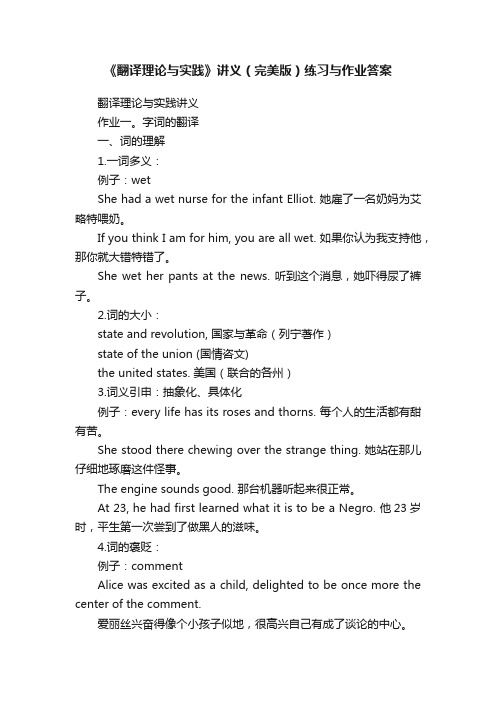
《翻译理论与实践》讲义(完美版)练习与作业答案翻译理论与实践讲义作业一。
字词的翻译一、词的理解1.一词多义:例子:wetShe had a wet nurse for the infant Elliot. 她雇了一名奶妈为艾略特喂奶。
If you think I am for him, you are all wet. 如果你认为我支持他,那你就大错特错了。
She wet her pants at the news. 听到这个消息,她吓得尿了裤子。
2.词的大小:state and revolution, 国家与革命(列宁著作)state of the union (国情咨文)the united states. 美国(联合的各州)3.词义引申:抽象化、具体化例子:every life has its roses and thorns. 每个人的生活都有甜有苦。
She stood there chewing over the strange thing. 她站在那儿仔细地琢磨这件怪事。
The engine sounds good. 那台机器听起来很正常。
At 23, he had first learned what it is to be a Negro. 他23岁时,平生第一次尝到了做黑人的滋味。
4.词的褒贬:例子:commentAlice was excited as a child, delighted to be once more the center of the comment.爱丽丝兴奋得像个小孩子似地,很高兴自己有成了谈论的中心。
But what a comment, she could not help reflecting, on her own charms.但她禁不住想到,这对她个人的魅力是多么大的讽刺啊。
He walked around the room. He then stopped and looked around, “comment” ?他在房间里走来走去,之后停下来环视着说:“谁有高见”?5.词的轻重:看词类、看场合、看句型、看习惯等等。
英语翻译基础2018(357)【试题+答案】江西师范
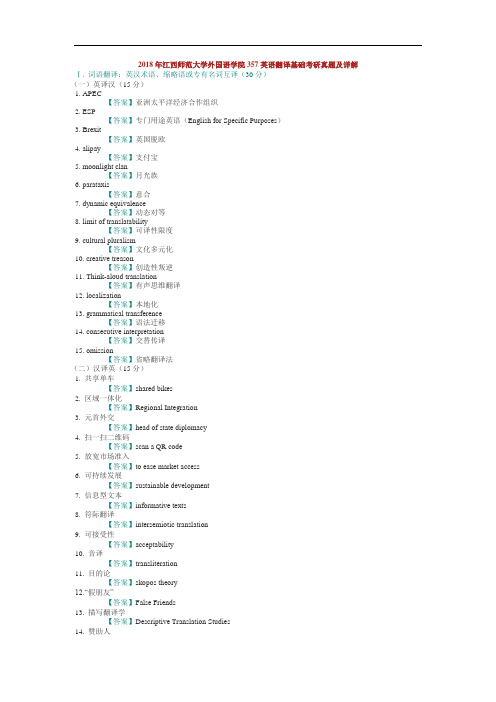
2018年江西师范大学外国语学院357英语翻译基础考研真题及详解Ⅰ. 词语翻译:英汉术语、缩略语或专有名词互译(30分)(一)英译汉(15分)1. APEC【答案】亚洲太平洋经济合作组织2. ESP【答案】专门用途英语(English for Specific Purposes)3. Brexit【答案】英国脱欧4. alipay【答案】支付宝5. moonlight clan【答案】月光族6. parataxis【答案】意合7. dynamic equivalence【答案】动态对等8. limit of translatability【答案】可译性限度9. cultural pluralism【答案】文化多元化10. creative treason【答案】创造性叛逆11. Think-aloud translation【答案】有声思维翻译12. localization【答案】本地化13. grammatical transference【答案】语法迁移14. consecutive interpretation【答案】交替传译15. omission【答案】省略翻译法(二)汉译英(15分)1. 共享单车【答案】shared bikes2. 区域一体化【答案】Regional Integration3. 元首外交【答案】head of state diplomacy4. 扫一扫二维码【答案】scan a QR code5. 放宽市场准入【答案】to ease market access6. 可持续发展【答案】sustainable development7. 信息型文本【答案】informative texts8. 符际翻译【答案】intersemiotic translation9. 可接受性【答案】acceptability10. 音译【答案】transliteration11. 目的论【答案】skopos theory12.“假朋友”【答案】False Friends13. 描写翻译学【答案】Descriptive Translation Studies14. 赞助人【答案】patron15. 语域分析【答案】Register AnalysisⅡ. 语篇翻译:英汉段落互译(120分)(一)英译汉(60分)Most parents want their children to be assertive, bold and brave, to take on challenges without fear of people or of failure. Some kids do just that, and when they do, the grownups swoon. This is how Presidents, movie stars and Olympic med alists start out, isn’t it? Who wouldn’t want a golden child? The problem, of course, is that if boldness is golden, reticence must be silver or bronze—or tin. Introverted children are everywhere—you may be raising one—yet too often they wind up without cheerleaders.So for starters, let’s remember that introversion, in most cases, is good. The accomplishments of deep thinkers, great poets, world-changing scientists stack up quite nicely against those of Oscar winners and Olympians, even if there’s not the same temperamental sizzle to go along with them. Jonas Salk and Marie Curie did not spend a lot of time in the club scene. Neil Armstrong is no one’s idea of a glad-hander. But the fact is, they, like thousands of history’s other greats, might never have a chieved the things they did without their quiet focus.The key for parents raising introverted children is first and most important to accept that vast personality differences exist among all kids, even when they grow up under the same roof with the same parents. My four children are incredibly different, as is the case with my siblings and me. But just because our kids present entirely different faces to us doesn’t mean they should get entirely different responses. It may be easier to react with enthusiasm and applause (often literally) to a child who is an athlete or a dancer than to one whose gifts lie in math and science. And it’s certainly easier to be charmed by your funnier, more charismatic kids than by your quieter, more taciturn ones. But rewarding your children’s diverse skills and styles with equal support is important all the same.Genuine maladaptive shyness, of course, is not at all the same as simple, healthy introversion—and it has very different causes and consequences. Left unaddressed, extreme shyness can hinder language and other kinds of cognitive development. It may also lead to depression, low self-esteem and simple loneliness. While healthy introversion is likely innate, shyness can be heavily influenced by environment. Dynamics in the home that can drive a child inward include abuse, trauma and alcoholism. Birth order, a bullying older sibling and flagrant favoritism by parents can contribute as well.【参考译文】大多数父母希望他们的孩子能自信、大胆勇敢、不怕别人或失败地去接受挑战。
MTI英语翻译基础考试样题
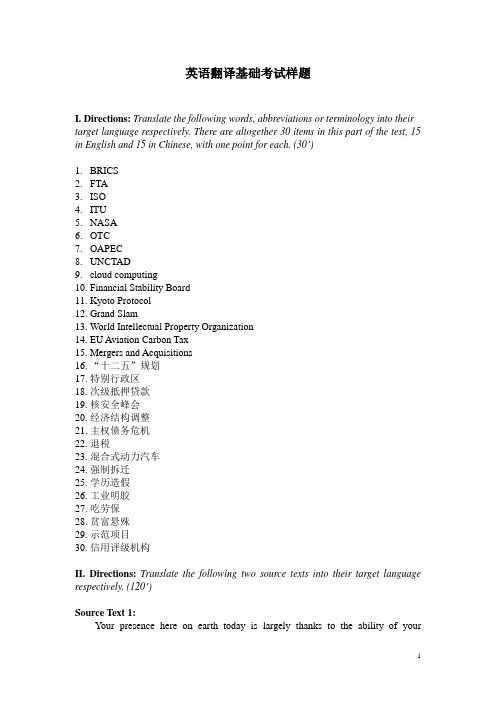
英语翻译基础考试样题I. Directions:Translate the following words, abbreviations or terminology into their target language respectively. There are altogether 30 items in this part of the test, 15 in English and 15 in Chinese, with one point for each. (30’)1.BRICS2.FTA3.ISO4.ITU5.NASA6.OTC7.OAPEC8.UNCTAD9.cloud computing10.Financial Stability Board11.Kyoto Protocol12.Grand Slam13.World Intellectual Property Organization14.EU Aviation Carbon Tax15.Mergers and Acquisitions16.“十二五”规划17.特别行政区18.次级抵押贷款19.核安全峰会20.经济结构调整21.主权债务危机22.退税23.混合式动力汽车24.强制拆迁25.学历造假26.工业明胶27.吃劳保28.贫富悬殊29.示范项目30.信用评级机构II. Directions:Translate the following two source texts into their target language respectively. (120’)Source Text 1:Your presence here on earth today is largely thanks to the ability of yourancestors to stay alive, at least until they were old enough to mate and breed. To do that would have required enough confidence to either hunt or negotiate for food and sex, but not so much confidence that they took daft risks, meaning that a degree of timidity, fear, anxiety and awareness of danger is very likely to be part of our DNA.So if you’re looking for universal confidence, i.e. a feeling of confidence that is with you at all times, or the kind of confidence that enables you to tackle tasks and situations that you have neither the skills nor the experience to deal with, you are going against your survival instincts. It’s right to feel fear under the right circumstances.As a child you were born in a state of spontaneity and relative fearlessness, but your survival depended on your ability to learn from both experience and your parents that there are many things that can harm or kill you. This makes sense, because the animal that is alert to danger usually lives longer than the animal that is oblivious to threat, brave beyond its abilities and takes risks without calculating that odds first. The animal that lives to fight another day is usually the one that avoids or runs from attack rather than the one that meets it square-on, constantly trying to punch above its weight by taking on enemies and situations that it has neither the muscle, skills nor experience to deal with.Unfortunately parents can allow their role as protector to usurp their role in teaching you how to be self-sufficient as soon as possible. When this happens they’ll often plant extra worries and cautions in your mind that can make you fearful as an adult. They just hope cowardice will keep you out of danger. (316 words)Source Text 2:自1976年联合国开始统计年轻人失业率以来,今年全世界15岁至24岁年龄段的失业人数创下新高。
郑州大学357英语翻译基础_2016(带答案)

2016年郑州大学357英语翻译基础考研题一、Sentence translation(TransIate the following text into Chinese (25 points))1. It is not known how rare this resemblance is, or whether it is most often seen in inclusions of silicates such as garnet, whose crystallography is generally somewhat similar to that of diamond; but when present, the resemblance is regarded as compelling evidence that the diamonds and inclusions are truly cogenetic.4generated the tensions that ultimately led to the American Revolution.【答案】现在,人们尚不知这种类似有多么罕见,也不知道这种类似是否最常见于像石榴石一样的硅酸盐内含物中——此类内含物的晶体结构通常和金刚石类似。
但这种类似一旦存在,即可视作金刚石与内含物是同源的强力证据。
【解析】本句的句子既长,专有名词又多,从句层出不穷,故而难懂。
在本句中出现的专有名词中,除了silicates硅酸盐这个单词常常出现于理科文章中,需要记忆之外,其他单词阅读现场简单处理一番既可:inclusions可以猜出是被包含的物质;garnet石榴石;crystallography只要能从词头推出这个单词与晶体有关即可。
【难度系数】4【分值】52. A long-held view of the history of the English colonies that became the United States has been that England’s policy toward these colonies before 1763 was dictated by commercial interests and that a change to more imperial policy, dominated by expansionist militarist objective, generated the tensions that ultimately led to the American Revolution.【答案】关于这块后来独立为美国的英国殖民地,人们长久以来的看法是:英国在1763年以前对于该殖民地的政策为经济利益所支配;后来,出于扩张主义的军事目标,英国的政策变得更倾向于帝国主义—这种改变导致了冲突的产生,并最终引发了美国革命。
英汉翻译基础教程练习答案

汉英翻译基础教程第一章汉英词汇比较与翻译 (2)第二章词法翻译的一般技巧 (4)第三章名词的抽象和具体译法 (9)第四章动词的翻译 (11)第五章数词和冠词的翻译 (12)第六章成语的英译 (13)第七章修辞格的翻译 (17)笫八章文化词语的翻译 (19)第九章汉英句子比较与翻译 (20)第十章换序和转态译法 (23)笫十一章断句合句译法 (25)笫十二章长句的翻译 (27)第十四章汉英语篇比较与翻译 (29)第十五章风格与翻译 (30)第十六章语用与翻译 (32)第一章汉英词汇比较与翻译第一节翻译中的选义一、结合语境选择较贴切的译文1. b2. a3. b4. a二、译出下列词语,注意词语的不同搭配1. a swarm of beesa brood of chickensa litter of pups2. a bevy of beautiful ladiesa pack of houndsa team of ducksa herd of antelopes3. unfailing supportproactive fiscal policymake effective use of overseas resources4. make a phone calltake a taxiknit a woolen sweaterfetch waterplay basketballspray insecticide5. basic wagecapital constructionessential commodityprimary industryfundamental interest三、翻译下列句子,注意画线词语的理解1. The two leaders exchanged views on bilateral relations and issues of common concern2. Party members should listen carefully to the opinions of the general public.3. They offered some suggestions for the revision of the plan.4. Everyone complained against such a practice.5. They had a dispute at the meeting.6. You should follow the doctor's advice.7. They reached a consensus on this issue.8. There is still some unfinished business to settle.9. We have consulted him about the matter.10. Please go back. There is nothing of your concern now第二节翻译中的选词一、翻译下列各句,注意词的选择和搭配。
郑州大学357英语翻译基础_2015(带答案)

2015年郑州大学357英语翻译基础考研题一、Sentence Chinese to English(Translate the following text into English. (15 points))1.海淘【答案】cross-border online shopping【解析】海淘即海外/境外购物,就是通过互联网检索海外商品信息,并通过电子订购单发出购物请求,然后填上私人信用卡号码,由海外购物网站通过国际快递发货,或是由转运公司代收货物再转寄回国。
分为国内跨境电商代购和海外直邮直购两类。
【难度系数】2【分值】22.黑车【答案】unlicensed cab【解析】所谓“黑车”,是指没有在交通运输管理部门办理任何相关手续、没有领取营运牌证而以有偿服务实施非法运营的车辆。
【难度系数】2【分值】23.物流【答案】logistics【解析】物流(英文名称:logistics)原意为“实物分配”或“货物配送”,是供应链活动的一部分,是为了满足客户需要而对商品、服务消费以及相关信息从产地到消费地的高效、低成本流动和储存进行的规划、实施与控制的过程。
【难度系数】2【分值】24.《诗经》【答案】the Book of Songs【解析】《诗经》,是中国古代诗歌的开端,最早的一部诗歌总集,收集了西周初年至春秋中叶(前11世纪至前6世纪)的诗歌,共311篇。
【难度系数】2【分值】25.亚健康【答案】Sub-health【解析】亚健康是指人体处于健康和疾病之间的一种状态。
处于亚健康状态者,不能达到健康的标准,表现为一定时间内的活力降低、功能和适应能力减退的症状,又称之为“次健康”。
【难度系数】2【分值】26.自驾游【答案】self-driving tour【解析】自驾游,简单地说就是自己驾驶汽车出游。
自驾游属于自助旅游的一种类型,是有别于传统的集体参团旅游的一种新的旅游形态。
【难度系数】2【分值】27.太空垃圾【答案】space debris/Space junk【解析】太空垃圾(Space debris或Space junk),是指在宇宙空间中的各种人造废弃物体及其衍生物。
《英语翻译基础》期末复习完整
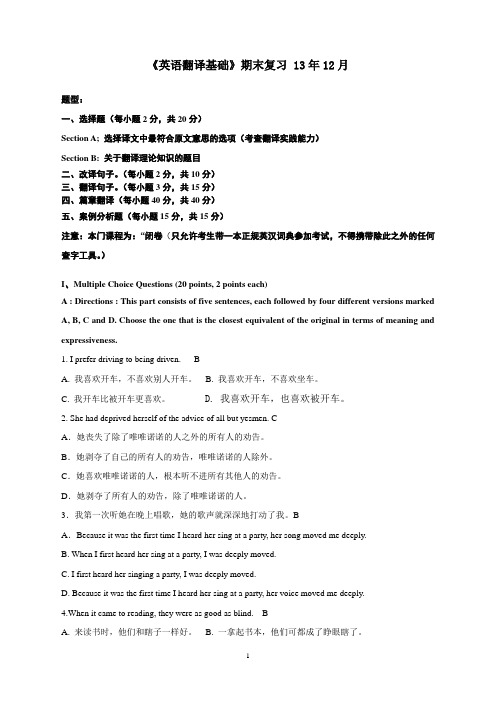
中国历史人物——贺知章提到贺知章,大家可能没有太多深刻的印象,但一提到他创作的古诗——“不知细叶谁裁出,二月春风似剪刀”、“少小离家老大回,乡音无改鬓毛衰”,相信大家都觉得耳熟能详,还能脱口而出。
那么,今天就向大家介绍一下这位初唐的大诗人,以及他开挂的人生。
作为唐朝诗人,尤其是在初唐、盛唐阶段的诗人,骨子里大多狂放不羁,毕竟唐朝社会那开放包容、繁荣昌盛的社会背景给了他们这样做的资本。
从初唐的四杰到盛唐的李白,在他们的诗歌作品和行事风格中,都不难看出骨子里“天生我材必有用”的强烈自信。
贺知章作为初唐诗人,身上自然会有唐代社会的烙印,他高逸豁达,随性洒脱。
在那个人才辈出的时代,诗人的“狂傲”是一种合理的存在,但贺知章不一样,他的狂,少了一份傲慢,多了一份从容。
他张弛有度,纵情不羁,也正因如此,他的一生才如此平坦顺利,一路有贵人相助,最终百官相送,功成身退。
少年时期的贺知章喜爱读书,十来岁就会自己写诗作文,在家乡已经很有名气了。
在公元695年,武则天恢复科举考试后,30岁的他便参加进士考试,成为当年第一名的金榜状元,也是浙江历史上第一位有资料记载的状元。
年少有为的他,从此便正式进入官场,开始他长达五十余年的仕途之路。
37岁这一年,是贺知章生命中最重要的转折点。
他虽然是高中状元,但在朝野中一直没有什么大发展。
幸亏他有位做宰相的表兄陆象,一直在暗中提携他,把他从无人问津的文职小官提拔到了国子四门博士。
但是,好运不长,在唐玄宗即位后,就罢免了陆象的宰相之位,贺知章也因此受到影响。
没有了强大的后盾的他,此后几年基本是原地踏步,不温不火。
不过,当上帝为他关上了一扇门时,又在几年后为他打开了一扇窗。
很快,贺知章便遇到另一个贵人——张说。
当时的张说奉命征讨突厥,并大获全胜,朝廷百官都写诗祝贺他,贺知章也在其中。
他奉旨给张说写边塞诗,张说看了他创作的诗歌后,十分喜欢,并对贺知章的才学大加赞赏。
贺知章就在这个的祝诗事件中,给张说留下了深刻的印象。
英语翻译基础历年真题试卷汇编44(题后含答案及解析)全文编辑修改
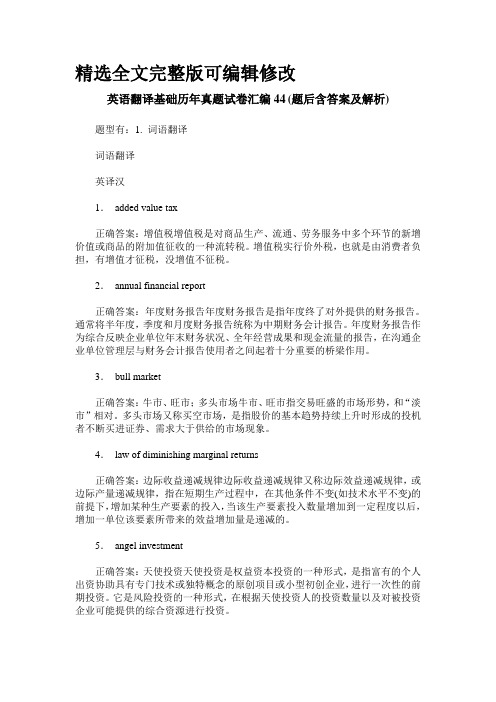
精选全文完整版可编辑修改英语翻译基础历年真题试卷汇编44(题后含答案及解析) 题型有:1. 词语翻译词语翻译英译汉1.added value tax正确答案:增值税增值税是对商品生产、流通、劳务服务中多个环节的新增价值或商品的附加值征收的一种流转税。
增值税实行价外税,也就是由消费者负担,有增值才征税,没增值不征税。
2.annual financial report正确答案:年度财务报告年度财务报告是指年度终了对外提供的财务报告。
通常将半年度,季度和月度财务报告统称为中期财务会计报告。
年度财务报告作为综合反映企业单位年末财务状况、全年经营成果和现金流量的报告,在沟通企业单位管理层与财务会计报告使用者之间起着十分重要的桥梁作用。
3.bull market正确答案:牛市、旺市;多头市场牛市、旺市指交易旺盛的市场形势,和“淡市”相对。
多头市场又称买空市场,是指股价的基本趋势持续上升时形成的投机者不断买进证券、需求大于供给的市场现象。
4.law of diminishing marginal returns正确答案:边际收益递减规律边际收益递减规律又称边际效益递减规律,或边际产量递减规律,指在短期生产过程中,在其他条件不变(如技术水平不变)的前提下,增加某种生产要素的投入,当该生产要素投入数量增加到一定程度以后,增加一单位该要素所带来的效益增加量是递减的。
5.angel investment正确答案:天使投资天使投资是权益资本投资的一种形式,是指富有的个人出资协助具有专门技术或独特概念的原创项目或小型初创企业,进行一次性的前期投资。
它是风险投资的一种形式,在根据天使投资人的投资数量以及对被投资企业可能提供的综合资源进行投资。
6.capital turnover正确答案:资本周转资本周转指不断重复、周而复始的资本循环过程。
资本必须在运动中才能实现其价值增值,这种运动不能孤立地循环一次便停下来,而必须持续不断地周期性地进行,即产业资本连续不断、周而复始的循环。
Translation基础英语4课本翻译参考答案
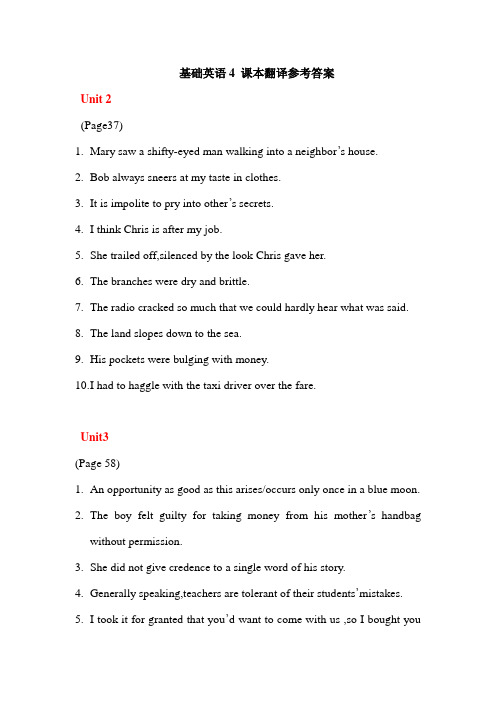
基础英语4 课本翻译参考答案Unit 2(Page37)1.Mary saw a shifty-eyed man walking into a neighbor’s house.2.Bob always sneers at my taste in clothes.3.It is impolite to pry into other’s secrets.4.I think Chris is after my job.5.She trailed off,silenced by the look Chris gave her.6.The branches were dry and brittle.7.The radio cracked so much that we could hardly hear what was said.8.The land slopes down to the sea.9.His pockets were bulging with money.10.I had to haggle with the taxi driver over the fare.Unit3(Page 58)1.An opportunity as good as this arises/occurs only once in a blue moon.2.The boy felt guilty for taking money from his mother’s handbagwithout permission.3.She did not give credence to a single word of his story.4.Generally speaking,teachers are tolerant of their students’mistakes.5.I took it for granted that you’d want to come with us ,so I bought youa ticket.6.Thanks to the manager’s repeated counseling ,the staff soon broke thebad habit of coming late to work.7.He’s furious with her now,but he’ll forgive her soon.It is just/only amatter of a few hours,that’s all.Unit 5(Page 100)1.If you can’t afford to pay in cash,you can buy the car on credit.2.I said I’d help him and that’s what I’m going to do .I shall keep myword.3.I ’ve a stake in this company and don’t wish to see it go bankrupt.4.With the development of industrial production ,the old feudal systembegan to fall apart.5.He is very competent and keeps everything straight on the farm.6.The new educational system aims to give the students the initiative tolearn more subjects.7.Before starting on our trip we should tune the car up.Unit6(Page 118)1.They are to have their wedding next month.2.He is to be congratulated on his brilliant discovery.3.If it were to rain tomorrow,the match would be postponed.4.Do not despair .The best is yet to come.5.That was in 1550.He was to sail to the New World of America in thefollowing year.6.You are not to talk in the reading room.7.The new traffic regulation are to be observed.8.The route is to be planned before the expedition.(Page120)1.The landlady told me that the rent must be paid in advance.2. Although this company boasts that its products are superior to those of other companies, they are actually inferior in quality.3. What lies at the root of the problem is their lack of interest.4. The police interviewed several witnesses, but none of them could tell how the accident came about.5. The new building of the department store does not conform to the safety regulations.6. She derived great satisfaction from her stamp collection.7. Colorful balloons and flags added to the festive atmosphere of the small town.8. Money is very important, but happiness is not always associated with wealth.Unit7(Page 137)1. It is a disgrace that he (should) lie in public.2. It is a pity that he should be so upset.3. It is a nuisance that I should have forgotten my ticket.4. It is a shame that our picnic should be spoiled by the rain.5. It is essential that you should attend the meeting.6.It is important that we should keep up with the most recent development in the world.7. It is desirable that university students should know how to work with computers.8. It is strange that he should have gone away without letting us know. (Page138)1. There is a Greek art collection on display at the museum at the moment.2. Lost in the forest and out of food, he was reduced to eating wild herbs and fruit to keep himself alive.3. This area has been marked off as a future playground.4. There was no choice but to wade through the muddy water.5. The congressman appealed to the government to set up more schools.6. They were in a dreadful plight when their money and passports werestolen while they were on holiday in a foreign country.7. At the urging of her friends, I arranged for a doctor to see her.8. He tried to keep up a calm appearance, but his trembling voice gave him away.Unit9(Page 187)1.She seems to take little pleasure in doing such things.2.The professor told us that the tradition of landscape painting coulddate from the prehistoric age.3.After attending the lecture of the famous writer ,he decided to give upmedicine and take to literature.4.Let’s dispense with the formalities and go directly into the discussion.5.These animals run extraordinarily fast and in consequence theirhunting methods are very efficient indeed.6.The police searched every house in the district for the escapedcriminal,but to no avail.7.Parents tend to take very great pride in the achievements of theirchildren.Unit 10(Page 206)1.Many developing countries,after independence,were afflicted witheconomic problems to begin with.2.In order to protect domestic industries,the government decided toimpose anti-dumping tariff on imported products.3.Knowledge without practical experience counts for little.4.Thousands of people were forced to abandon their homes to theinvading enemy troops.5.I’ve lived in Shanghai so long that I’ve looked upon/on the city as mysecond hometown.6.The roof will have to be propped up while repairs are being carriedout.7.In (the) face of great hardship,he managed to keep his sense ofhumor.Unit 14(Page 289)1.The people in the flooded area are hungry for provisions,clothes andmedicine.2.As he sat up late watching TV,(It’s) no wonder that he looks so tired.3.If I were you,I wouldn’t get involved with/in those complicatedaffairs.4.Her skills are so excellent that the cakes she makes are simply worksof art.5.I know it was my fault but there is no need to rub it in.6.This sort of work calls for a lot of patience.7.The government declared that its foreign currency reserve is strongenough to resist the financial crisis.Unit15(Page 309)1.The tourists cheered with excitement when they saw water cascadingdown the mountainside.2.Owing to the policy of reform,the small town is thriving day by day.3.Could you read through this for me and highlight the importantpoints?4.At times I wonder if rote lerning is worthwhile.5.The superstitions that used to prevail in Old China are disappearinggradually.6.Thanks to the improvement in export sales,the company hassuccessfully fulfilled its marketing plan.。
- 1、下载文档前请自行甄别文档内容的完整性,平台不提供额外的编辑、内容补充、找答案等附加服务。
- 2、"仅部分预览"的文档,不可在线预览部分如存在完整性等问题,可反馈申请退款(可完整预览的文档不适用该条件!)。
- 3、如文档侵犯您的权益,请联系客服反馈,我们会尽快为您处理(人工客服工作时间:9:00-18:30)。
英语翻译基础讲义第一章翻译的基本原则1.Nature of Translation(翻译的性质)Translation is a science.Translation is an art.Translation is a craft.Translation is a skill.Translation is an operation.Translation is a language activity.Translation is communication2.Principles of Translation(翻译的原则)Three characters “信,达,雅”(faithfulness, expressiveness and elegance)———严复《天演论》Three characters “信,达,切”(faithfulness, expressiveness and closeness) ———刘重德《翻译十讲》Summary:忠实与通顺(1) Faithfulness of Translation (翻译的忠实)Strictly speaking, faithfulness is the generalization of the principles of translation. That’s to say, true translation demands that the translator be faithful to the content, language and style of the original at the same time.Eg. 1.War, pestilence and famine consumed one million people.战争,瘟疫和饥馑毁掉了一百万人。
该句译文从三个方面与原文都是一致的。
内容上,措辞完全对应;形式上,中英文都是陈述句,且语序相同。
2.The prize winner wears his honours modestly.1)荣获者带着他的荣誉谦逊地。
2)获奖者谦逊地对待他的荣誉。
3)获奖者虽尊不傲。
三种译文中,第一种完全是对译,读起来别扭,意义也费解。
第二种译法对关键词wear的词义稍有引申,词序也作了一定的调整,合乎汉语的表达习惯,基本上表达了原文的意义。
第三句形式上脱离了原文,单个词义也未与原文相对应,但从句子整体意义上,更近原文,更全面、准确地传递了原文的信息,汉语更精练,顺达。
1.Avoid translating word by word(不可词词对译)Eg. Milky Way(误译牛奶路)---The pale white band of stars and clouds of gas that can be seen across the sky at night.例如,对以下两个问句的回答A) Did you go to see the film last night?B) Didn’t you go to see the film last night?Eg.No, I didn’t.(A句应是“不,我没去”B句应是“是的,我没去。
”)试比较下列译法的优劣:Eg. Greatest compensation for wrongful imprisonment.1.对错误监禁的数额最大的赔偿。
2.最大数额的冤狱赔偿金.Eg.The chief criminals shall be punished without fail.1.主要罪犯将绝对受到惩罚2.首恶必办.显然以上两个例子第二种译法较好。
2.Avoid the cultural misunderstanding(避免文化误解)Eg. Love me, love my dog.(爱屋及乌)Eg. Every dog has its day.(人人都有得意时)Eg. Talk horse (吹牛)Eg. Lock the stable door after the horse is stolen.(亡羊补牢)Eg.Like a cat on hot bricks.(象热锅上的蚂蚁)有时甚至要创造新词。
Eg. He became dissatisfied with modern life and man’s selfish wish for private wealth, so he went and joined a Hippie commune.出于对现代生活的不满和对人们自私的个人财富占有欲的反感,他加入了嬉皮士群居社.3.Avoid the misunderstanding of idioms (避免误解英语成语)Spill the beans (泄露机密)E g. You can’t trust him to keep a secret, he is sure to spill the beans before long.切勿相信他会保守秘密,过不多久,他肯定会泄露于人的.Eg. Who wears the trousers in your family?如将这句话译为“你们家谁穿着裤子?”显然不通。
这里wear the trousers是当家的意思,故应译为“你们家谁当家?”4.convey the implied meaning(要注意把握原文的内容,善于细腻地传递原作的弦外之音)Eg. You hold the office, but you don’t govern.这句话但从意思上讲,很接近中文中的一句俗话“你占着茅坑不拉屎”,但这句话是美国总统里根和卡特在电视辩论中的一句话,如此译出会让人觉得粗俗不堪。
应译为“你占着总统的职位,却治理不了国家.”Eg. Go & Come都用作系动词,与形容词连用表示“变成某种状态或情况”如:Go bad(变坏), go deaf(变聋).&come loose(松动了),come true(成为现实) 但两者在词义上有细微的差别,在以下两个句子中:Look, it has come green.(瞧,液体已经变绿了!)Look, it has gone green.(瞧,液体竟然变绿了!)(2)Faithful to the structure(忠于原文的形式)Eg. I hope you have a happy future before you.我希望你有一个幸福的未来.How do you have the face to say such things?你怎么有脸说出这等话来?以上两句译文与原文的形式完全一致。
1)不能只看表面形式,要看句子所起的作用.Have you had your breakfast?/Where are you going?在中文中只表达一种问候,在英文中应用“hello”或“good morning”代替。
2)不能只追求形式上的一致而犯形式主义的错误.Eg. In New York, it is referred to as “Saint John the Unfinished”1.在纽约,它被认为是“未完成的圣约翰”2.在纽约,人们称之为“未竣工的圣约翰教堂”虽然第一举译文形式上与原文一致,实际上,第二句在意义上更接近忠实于原文。
Eg. Pieces of stained glass dated before AD 850, some possibly even to the 7th century, were excavated by Professor Rosemary Cramp, which were placed into a window of that date in the nearby St. Paul’s Church.如按原文的结构译出为:被罗斯马利·克兰普教授挖掘出来的,可追溯到公元850年,有些甚至可以追溯到七世纪的数块有色玻璃,在当时曾被装在圣保罗教堂附近的一个玻璃上.实际上我们应该把原句拆开来译:罗斯马利·克兰普教授挖掘了数片彩色玻璃,他们制造于公元850年,有些甚至可能造于七世纪.这些玻璃在当时曾用来装饰离发掘地不远的圣保罗教堂的窗户. Come, well, here, there 加强语气Come, John, don’t be so cross.得啦,约翰,别那么怒气冲冲了.Come, cheer up!喂,振作起来吧!Well, well! I should never have guessed it.哎呀,我永远也猜不出.My friend here was a witness of the accident.我得朋友就是这事故的见证.(3)Faithful to the style(忠实于原文风格)风格可分为Formal&informal也可分为Positive/negative, deep/plain, humorous/ rigid还可分为(1)冷淡的或演说性的(2)正式的或慎重的(3) 商量的(4)随便的(5)亲密的等.从谈话方式上来看又分为有修养有文化人讲的标准语,口语,和未受过教育的人所说的粗话,俗话;正式场合使用的语言和非正式场合使用的语言.For all the tea in China(用来表示强烈的拒绝)That man was so rude to me. I wouldn’t go back to that job for all the tea in China! 1.那人对我太无礼了,我无论如何也不再去做那份工作了.2.那家伙对我太无礼了,十八抬大轿来请,我也不去做那分工作了.后一种译法更口语,更直接。
第二章翻译的过程The process of translationThree stages:1.Understanding2.Re-expressing3.EditingUnderstanding1.Understanding the meanings of dictions in the context.(在上下文中理解词义)A) Draw a line from A to B.(线)B)The ship crossed the line.(赤道)C) Cooking is more in your line than mine.(为某人之所长)D) They were given their marriage lines after the registration.(结婚证书)E)She bought an overcoat lined with silk(衬里于…).Eg. Interrupted only briefly by the swearing-in of a new senator, Senator Strom Thurmond spoke against the Civil Right Bill for 24 hr 19 min on 28---29th,1957.参议员斯特洛姆·瑟曼德1957年8月28日至29日所做的反对民权法案的演说长达24小时19分钟,仅被一个新参议员的咒骂短时间被打断.这样的译法显然没有理解swear-in的意思,swear虽有咒骂的意思,但这swear-in意为“宣誓就职”.故应译为“参议员斯特洛姆·瑟曼德1957年8月28日至29日所做的反对民权法案的演说长达24小时19分钟,期间仅因一新议员宣誓就职而短暂中断.”2.Understanding the background(了解原文所涉及的事物和与原文有关的背景)<水浒>中的东京与日本的东京(Tokyo)是两个概念Understanding澹澹长江水悠悠远客情.落花相与恨,到地一无声.-----韦承庆<南行别弟>Mournfully, mournfully roles the long River,Saddened, ah saddened, the stranger’s breast.The flowers as they fall his fate recall,As each flutters down in the earth to rest.-----Fletcher诗中的长江并非Yangtze River,而是Long RiverCountry-house并不一定是“乡村住宅”,而是有钱人的乡间别墅.“问题”一词我们可译作Question, problem, trouble, point, issue,究竟何为恰当译法,需根据情况斟酌.当时我们正在长征的路上,每天行军一百多里.有人译为We were on the Long March. Every day we marched a hundred li or more. <高级英汉双解词典>:march: walk as soldiers do, with regular and measured steps.〈朗曼当代英语词典〉: to walk with regular, esp. forceful steps like a soldier.显然用March不如walk.准确.Re-expressing1.improving Chinese ability(要注意提高中文修养)Cotton fells soft.棉花使人感到柔软。
